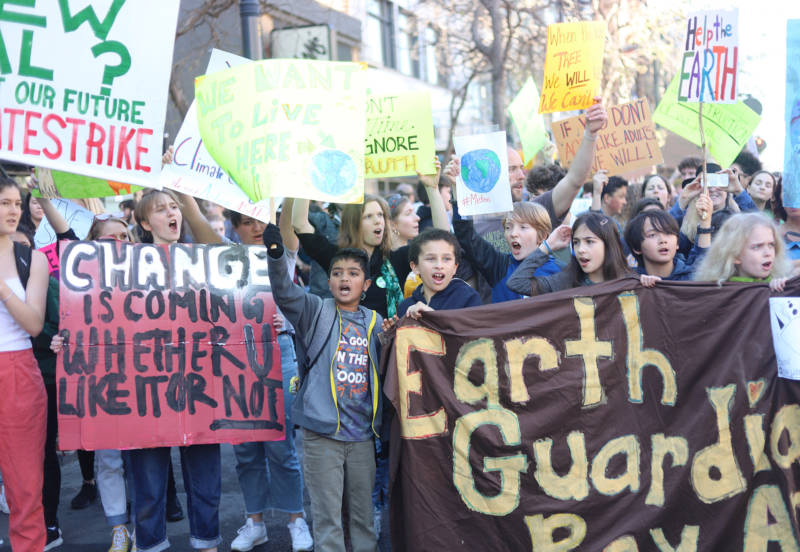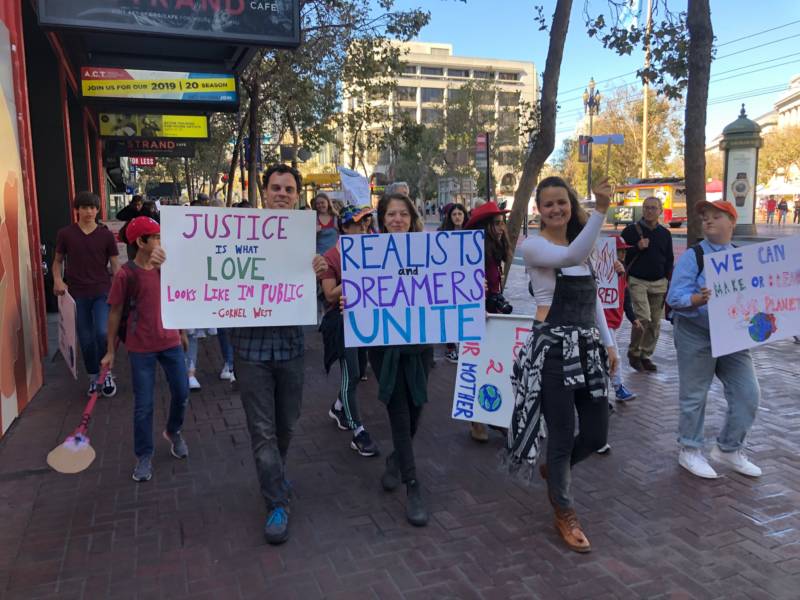In 2015, Bay Area lawyer and activist Sarah Jornsay-Silverberg found herself in Paris representing island nations at the United Nations Climate Change Conference. She was thrilled to be there.
Climate Change Despair Is Real. This Is How You Fight It

As the event progressed, however, “it was really clear that we were not going to achieve what we’d hoped,” she said.
What she and her colleagues had hoped for was a deal to limit global temperature rise to 1.5 degrees Celsius this century and a binding mechanism to enforce that. What they got was the Paris Agreement, which aims to keep global temperature rise to “well below 2 degrees Celsius” — and which countries have signed on to through voluntary pledges.
Instead of celebrating in the streets, she found herself curled up in her hostel bed, crying.
 The depression that struck Jornsay-Silverberg, 34, in 2015 still comes and goes today. She worries about ecosystems, native people and their habitats, the Amazon. She is also grieving a vision of her future that may no longer become a reality.
The depression that struck Jornsay-Silverberg, 34, in 2015 still comes and goes today. She worries about ecosystems, native people and their habitats, the Amazon. She is also grieving a vision of her future that may no longer become a reality.
“People like myself are deciding whether [we] even want to have children,” she said. When she was younger, she always assumed that she would.
The Rise of Eco-Anxiety
Environmental activists like Jornsay-Silverberg are not the only ones feeling overwhelmed with despair as the climate changes. While “eco-anxiety” is most commonly used to describe these feelings, therapists and others have bandied about different labels, too: climate anxiety, climate despair, eco-despair and eco-grief.
The American Psychological Association even published a guide for therapists to help them assist their patients. In it, they wrote, “the psychological responses to climate change, such as conflict avoidance, fatalism, fear, helplessness and resignation are growing. These responses are keeping us, and our nation, from properly addressing the core causes of and solutions for our changing climate, and from building and supporting psychological resiliency.”

Robin Cooper, of San Francisco, is one of the founders of the Climate Psychiatry Alliance, a group of psychiatrists working to highlight how climate change impacts mental health, and how to help those affected.
She said she and her colleagues are seeing more patients with “tension, anxiety, worry, depression” about the climate.
In cases like this, one of the first things Cooper said she does is acknowledge the realistic nature of a patient’s concerns. Unlike an irrational fear, eco-anxiety is a healthy response to a serious risk, she said.
“We are biologically wired to respond with anxiety to alert us to respond to real threats,” she said.
Despair’s Antidote
So if the negative aspects of climate change won’t be going away, how do we “treat” eco-anxiety?
Experts seem to agree on a three-part strategy:
- Come together in community. “Find allies who understand what [you’re] feeling… and get together with them,” said Craig Chalquist, a psychologist and professor at the California Institute of Integral Studies. He said it can even be something informal. Often, people struggle with these feelings in isolation, since bringing up climate change is taboo in many social situations.
- Process your feelings. This can happen through talking, grief groups and spending time in nature. Really? Just talk about such a huge issue? Chalquist said yes, adding that people with eco-anxiety then “quickly move from that phase into, ‘What can I do?'”
- Identify what specific problems speak to you, and get to work. Interested in oceans? Food systems? Reforestation? Chalquist said because all these aspects of the environment are connected, “to work on one is actually to bring some healing to the whole thing.”
Sarah Jornsay-Silverberg said these steps have been crucial for her mental health.
She has found meaningful community through the Good Grief Network, a group that follows a 10-step program to combat despair and eco-anxiety, and build “personal resilience.” Jornsay-Silverberg described this resilience as the ability to face the climate crisis head-on while not being bowled over by it.
Good Grief steps range from “accept the problem and its severity,” to “reinvest in problem-solving efforts,” according to the group’s website. Good Grief has been a place for Jornsay-Silverberg to process her emotions about the climate crisis.
“It’s really useful to be in community,” Jornsay-Silverberg said. She doesn’t feel like she’s bringing other people down “when I talk about where my mind goes and how sad and dark it feels sometimes.”
It has also reinvigorated her desire to fight for the environment in several ways. First, she and some friends are starting a Good Grief group in the Bay Area that’s open to new people. Second, she is launching an outdoor class aimed at helping kids develop emotional resilience to face whatever challenges our society may face in the future. And third, she is hitting the streets: She and friends marched in the recent Global Climate Strike in downtown San Francisco.
“This is the antidote,” she said walking down 7th Street last Friday. “Being surrounded by people that also care about this, you feel so supported and held by this community. Like look at how many young people are here with their signs. I’m going to cry, you know?”
Jornsay-Silverberg’s eco-anxiety is not gone, and it probably never will be. But her actions help her feel like she is part of the solution.
“You don’t have to be a trained climate activist to play your part,” she said. “You just have to figure out what you’re good at and how you are a useful contributor, and just stick with that.”
This story is part of KQED Science’s partnership with Covering Climate Now, a global collaboration of more than 300 news outlets to strengthen coverage of the climate story.
